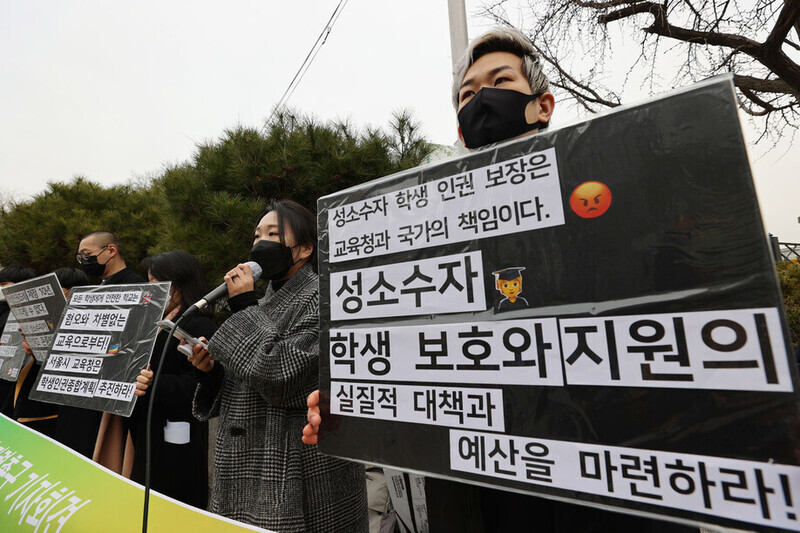hankyoreh
Links to other country sites 다른 나라 사이트 링크
[Guest essay] Korea’s own “Don’t Say Gay” act


By Han Chae-yoon, activist with the Korean Sexual Minority Culture & Rights Center
A recent Seoul metropolitan government ordinance has been labeled “absurd” and “anachronistic” by the media and by many online.
Although it is an ordinance proposed by a civic group instead of the city council, the contents of the ordinance were revealed to the public when the council’s deputy chief of staff’s office asked the Seoul Metropolitan Office of Education for review.
The ordinance is called the “Seoul Metropolitan Government Ordinance on Sex and Bioethical Standards for School Members.” Although the name contains nothing but well-meaning words like “bioethical,” the content of the ordinance itself is nothing but bizarre.
The purpose of this ordinance is to “create a school culture in which students, faculty members, and guardians respect sex and bioethical values so that students can aim for peak mental and physical health enabling them to form and develop autonomous personalities,” but the text itself argues that students’ rights to sexual self-determination should be kept at a minimum.
Adolescents are thought of as people needing protection, and parents are given the right to censor education conducted by teachers and schools. In principle, parents’ rights to educate their children is superior to that of all other educational parties, and guardians have the right to supervise their young learners in a way that fits students’ growth stages.
If one looks at the provision that states, when conducting sex education, the superintendent of education and the head of school should inform students’ guardians what will be covered in advance, and the provision that states that sex education courses should be operated according to age, the infamous “Florida Parental Rights in Education Act” made in March 2022 is brought to mind.
Also known as the “Don’t Say Gay” act, this law is the work of Gov. Ron DeSantis, who is considered a frontrunner to be Republicans’ next presidential candidate. He denies any criticism stating that the act is homophobic as “the word homosexual is not once mentioned in the bill,” but if one looks at the text itself, one realizes that it would probably be better to refer to those at the heart of the bill as “queer.” The provisions of the law are quite ambiguous, which seems to be the intention.
To start, school staff or third parties cannot explain or discuss anything related to sexual orientation or gender identity in the classroom. In addition, sex education is prohibited from being taught to kindergarteners up to third graders. From fourth grade onwards, sex education is only allowed within the range suitable for students’ age or development levels set by the state. If teachers fail to comply with these regulations, parents can file civil lawsuits against the educational authorities.
The clause stating that none of this should happen inside the classroom is very unclear. Does that mean that teachers can talk about sex education outside the classroom? Does it mean that one cannot even use LGBTQIA+ people in learning materials? Do queer people need to be erased from history? What should a teacher say if they witness someone bullying a queer classmate? What if a student asks whether transgender people were just “born wrong,” how should the teacher respond? If a student with queer parents paints a family picture in art class, should the teacher not react in any way?
The two regulations, one of which is so ambiguous that it does not specify what cannot be explained or discussed, and another that is very clear in stating that parents can sue those responsible for their children’s education, make schools and teachers uncomfortably aware of what will irk parents. As such, it prevents children and teenagers from experiencing a world that is full of a wide variety of people.
Seeing public education get tailored to parents’ liking is nothing short of a tragedy. In this situation, how is it possible to discuss the citizenship of a community?
The distance between Florida and Seoul is substantial, but the political and social landscape of the two cities make them seem to be next-door neighbors. The fact that this controversial ordinance was created and submitted to the parliament by a religious group advocating as a civic group raises further concerns.
City councilors are limited by the length of their terms and the size of their districts, but the religious community (which dreams of becoming a political force) will continue to spread its influence around the country.
There is strong pressure to oppose the enactment of the anti-discrimination law and to abolish the ordinance on student human rights.
Hearing about legislation being made in the US based on homophobia and discrimination only makes us feel more frustrated. This ordinance is not anachronistic simply because it is outdated, but because it is trying to create a future that we would do best to avoid.
Please direct questions or comments to [english@hani.co.kr]

Editorial・opinion
![[Column] Will Seoul’s ties with Moscow really recover on their own? [Column] Will Seoul’s ties with Moscow really recover on their own?](https://flexible.img.hani.co.kr/flexible/normal/500/300/imgdb/original/2024/0513/5917155871573919.jpg) [Column] Will Seoul’s ties with Moscow really recover on their own?
[Column] Will Seoul’s ties with Moscow really recover on their own?![[Column] Samsung’s ‘lost decade’ and Lee Jae-yong’s mismatched chopsticks [Column] Samsung’s ‘lost decade’ and Lee Jae-yong’s mismatched chopsticks](https://flexible.img.hani.co.kr/flexible/normal/500/300/imgdb/original/2024/0512/3017154788490114.jpg) [Column] Samsung’s ‘lost decade’ and Lee Jae-yong’s mismatched chopsticks
[Column] Samsung’s ‘lost decade’ and Lee Jae-yong’s mismatched chopsticks- [Correspondent’s column] The real reason the US is worried about Chinese ‘overcapacity’
- [Editorial] Yoon’s gesture at communication only highlights his reluctance to change
- [Editorial] Perilous stakes of Trump’s rhetoric around US troop pullout from Korea
- [Guest essay] Preventing Korean Peninsula from becoming front line of new cold war
- [Column] The state is back — but is it in business?
- [Column] Life on our Trisolaris
- [Editorial] Penalties for airing allegations against Korea’s first lady endanger free press
- [Editorial] Yoon must halt procurement of SM-3 interceptor missiles
Most viewed articles
- 1[Column] Samsung’s ‘lost decade’ and Lee Jae-yong’s mismatched chopsticks
- 2Ado over Line stokes anti-Japanese sentiment in Korea, discontent among Naver employees
- 3Korean auto industry on edge after US hints at ban on Chinese tech in connected cars
- 4Korean opposition decries Line affair as price of Yoon’s ‘degrading’ diplomacy toward Japan
- 5US has always pulled troops from Korea unilaterally — is Yoon prepared for it to happen again?
- 6[Editorial] Yoon’s gesture at communication only highlights his reluctance to change
- 7[Column] Will Seoul’s ties with Moscow really recover on their own?
- 8[Photo] Korean students protest US complicity in Israel’s war outside US Embassy
- 9Shuttering all foreign worker support centers, S. Korea leaves migrants to fend for themselves
- 10Korean med schools swallow bitter pill by pushing back classes to avoid mass flunking